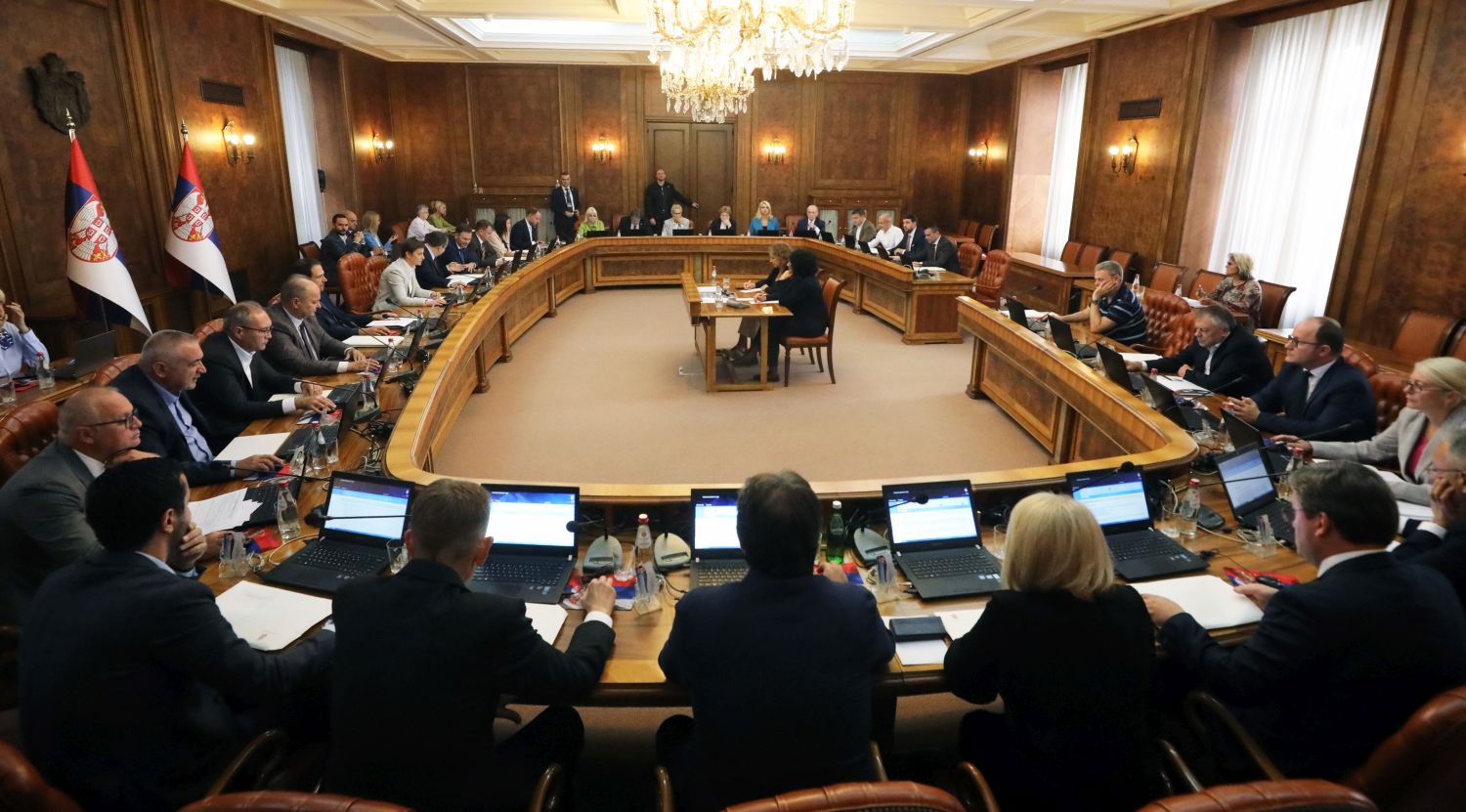The Serbian government adopted today the 2024 Budget Bill, which foresees total revenues in the state treasury in the amount of RSD 2,040.9 billion, which is RSD 136.9 billion, or 7.2 percent more in relation to the revenues provided by the 2023 budget revision.
- Serbia
Get to know Serbia
- Citizens
Culture and science
Health services
Pension and disability insurance
- Business
Employment
Economy
- Media
- Government
- Contact
Keep in touch
Keepin touch
Whether you have a question, comment, suggestion or any problem in the purview of the government, send us your message and we will try to respond as soon as possible. If your problem is not in our purview, we will forward your message to the relevant institution.
Government adopts 2024 Budget Bill
The proposed budget is focused on development, which implies the continuation of high investments in capital projects, the construction of highways, high-speed railways, schools, hospitals, the policy of increasing salaries and pensions, as well as building the country and protecting the living standards of citizens.
This bill envisages a fiscal budget deficit of RSD 197 billion, which is 2.2 percent of GDP and which is lower than the planned deficit for this year, which was projected at 2.8 percent of GDP by the budget revision.
The projected economic growth rate for 2024, according to the Ministry of Finance, is 3.5 percent of GDP. The public debt of the state sector is projected at 51.7 percent of GDP in 2024, which is far less than the 60 percent allowed by the Maastricht agreement.
Also, the medium-term fiscal framework envisages a gradual reduction in deficit of the state sector to the level of 1.5 percent of GDP in 2026 and a decrease in the share of public debt to 50 percent of GDP.
The budget bill foresees that, starting from 1 January 2024, pensions in Serbia will be higher by 14.8 percent, wages in the public sector by 10 percent, and the minimum wage by 17.8 percent.
In order for the burden of increasing the minimum wage not to fall completely on employers, from 1 January 2024, it is planned to increase the non-taxable part of the gross salary by 15.1 percent, from RSD 21,712 to RSD 25,000.
At the level of the state sector, RSD 598.8 billion, or 6.8 percent of GDP, have been earmarked for capital investments.
Members of the government adopted the Bill on amendments to the Law on health insurance, which proposed that the elected doctor, as a rule, determine temporary incapacity for work for up to 30 days, instead of the previous 60 days, and that after that, the temporary incapacity is determined by the first instance medical commission of the Republic Health and Disability Insurance Fund.
Government members also adopted the Bill on health documentation and health records, which harmonises the way of keeping such documentation and records in electronic form.
The Bill on incentives in agriculture and rural development was also adopted and amended, which, among other things, proposes an increase in the maximum area of cultivated agricultural land from 20 to 100 hectares for which the right to basic and production-related incentives for plant production can be exercised.
In addition, with these changes, the minimum amount of premium for milk was increased from RSD 10 to RSD 15, as well as the minimum amount for basic incentives per plant production area from RSD 6,000 to RSD 12,000.
-
 Belgrade, 19 February 2026
Belgrade, 19 February 2026Government ministries’ priority projects for 2028-2030 presented
-
 Belgrade, 12 February 2026
Belgrade, 12 February 2026Decree adopted establishing air quality monitoring programme within state network
-
 Belgrade, 6 February 2026
Belgrade, 6 February 2026Electricity bills to be reduced for citizens who were without power in January
-
 Belgrade/Dubai, 4 February 2026
Belgrade/Dubai, 4 February 2026Agreement on exchange of experiences, modernisation of work of governments of Serbia, UAE signed
-
 Belgrade, 30 January 2026
Belgrade, 30 January 2026Blockade of border crossings lifted following agreement with hauliers
-
 Belgrade, 30 January 2026
Belgrade, 30 January 2026Strengthening capacities, accelerating process of Serbia's accession to EU
-
 Belgrade, 29 January 2026
Belgrade, 29 January 2026Nomination of Serbia’s natural assets for inscription on World Heritage List
-
 Belgrade, 26 January 2026
Belgrade, 26 January 2026Members of Serbian water polo team awarded €20,000 each
-
 Tara, 24 January 2026
Tara, 24 January 2026Government adopts Bill amending Law on fees for use of public goods
-
 Belgrade, 22 January 2026
Belgrade, 22 January 2026Amount of special fee to incentivise privileged electricity producers remains unchanged


